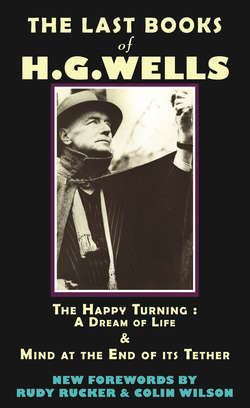Читать книгу The Last Books of H.G. Wells - Colin Wilson - Страница 7
На сайте Литреса книга снята с продажи.
ОглавлениеI
HOW I CAME TO THE HAPPY TURNING
I AM DREAMING FAR more than I did before this chaotic war invaded my waking hours. My days are now wholly full of war effort: What can I do? What ought I to do? Where is the next opportunity and what dangers gather ahead? I am urgent. I overstrain. And now something deep within me protests and rebels, and says: “These war-makers have yoked and enslaved you. You are defeated if you give yourself wholly to war.”
I answer evasively: “Presently I will relax.”
That serves in the daytime but not at night. I take care to keep as fit as I can and not to let my war preoccupations develop into the nervous waste of anxiety. I never dream about war. I dream neither of its horrors nor its strategy. When I sleep, a more adult and modern and civilized part of my being comes into play. More and more are my dreams what I believe the psychologists call compensatory; the imaginations I have suppressed revolt and take control.
Some time ago I dreamt a dream that recurs with variations again and again, so that it is a sort of Open Sesame for all my excursions into dreamland. In my daytime efforts to keep myself fit and active, I oblige myself to walk a mile or so on all days that are not impossibly harsh. I walk to the right to the Zoo, or I walk across to Queen Mary’s Rose Garden or down by several routes to my Savile Club, or I bait my walk with Smith’s bookshop at Baker Street. I have to sit down a bit every now and then, and that limits my range. I’ve played these ambulatory variations now for two year and a half, for I am too busy to go out of town, out of reach of my books, and my waking self has never uttered a protest. But now the—what do they call it?—subliminal consciousness?—has in the most charming way asserted my unformulated desire, with this dream, which I will call the dream of the Happy Turning.
I dream I am at my front door starting out for the accustomed round. I go out and suddenly realize there is a possible turning I have overlooked. Odd I have never taken it, but there it is! And in a trice I am walking more briskly than I ever walked before, up hill and down dale, in scenes of happiness such as I have never hoped to see again. At first the Turning itself was the essence of the dream. Now, directly my dream unfolds I know where I am; it has become a mere key to this delightful land of my lifelong suppressions, in which my desires and unsatisfied fancies, hopes, memories and imaginations have accumulated inexhaustible treasure.
For the first time in my existence I realize what it is to have possession of an entirely healthy and balanced body. I was born astigmatic and in those days nobody bothered about common children’s eyes. I could never be sure of bowling a straight ball, and when I jumped down I hit the ground too soon or too late. I was under-nourished and tuberculous, so that I was a skinny puny youth, easily fatigued. Tolerable health came only in my thirties. Muscular precision and hardiness I shall never know in my waking life. But now, beyond the Happy Turning, I leap gulfs unerringly, scale precipices, shin up trees and am indefatigable. There are no infections there; no coughs, no colds; to cough or sneeze would be to wake up and tumble back headlong into those unhygienic present-day realities where dirt-begotten epidemics have their way with us. Maybe a day will come when a cleansed and liberated world will take the Happy Turning in good earnest and pass out of the base and angry conflicts which distract us from wholesome living. All such liberations are possible beyond the Turn. Now I count it good fortune that I can even dream of the gay serenity of that Beyond.
The Happy Turning leads to a world where distance is abolished. Certain phrases—parroted phrases empty of belief—are already to be found in the newspapers and speeches—the abolition of war, the abolition of distance, the abolition of competition and social inequality. But after people have repeated a phrase a great number of times, they begin to realize it has meaning and may even be true. And then it comes true. Beyond the Happy Turning these phrases are realities; hopes fulfilled.
